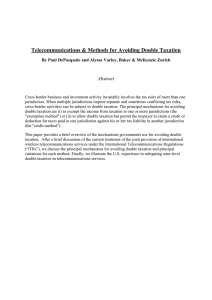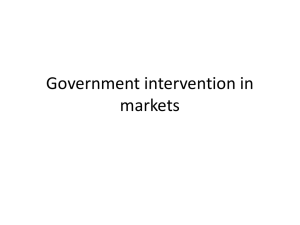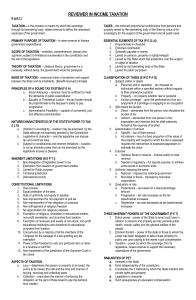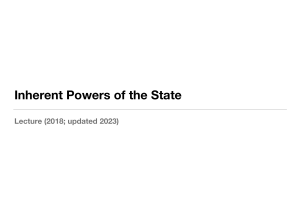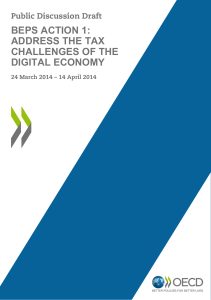The Political, Legal, and Regulatory Environments Global Marketing
advertisement
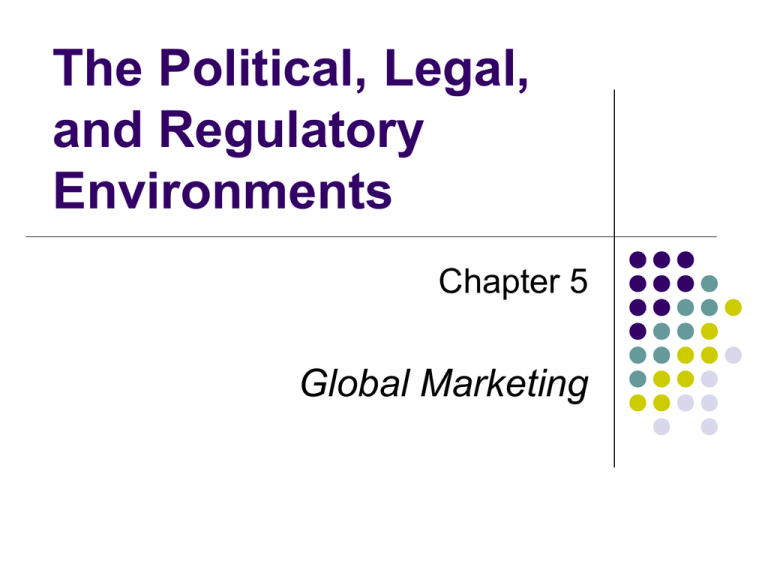
The Political, Legal, and Regulatory Environments Chapter 5 Global Marketing How International Law Affects Marketing: Examples Product: ISO standards, different environmental rules and safety related legislation across countries Price: anti-dumping legislation Place: country specific distribution systems / rules Promotion: topics of ads and commercials, limitation on product samples The Golden Rule: there is always an opportunity for negotiations with governments or their agencies Political Dimensions The political environment provides a highly influential context for business operations Political Risk Risk of change in political environment or government policy that would adversely affect a company’s ability to operate effectively and profitably Businesses seek political stability When perceived political risk is high, a country will have a difficult time attracting foreign direct investment (FDI) Causes of Political Risk Tension between aspirations and reality Primarily occurs in lower and lower-middle income countries Indonesia: Malaysia: Political risk in high income countries: it is generally due to a long-standing conflict Northern Ireland Taxation Policies Government taxation policies High taxation can lead to growth in a black market Corporate taxation Companies attempt to limit tax liability by shifting location of income Transfer Pricing is a widely used technique by multinationals to counter high taxes Trade Interventions 1. Subsidies: Some form of payment to domestic producers: cash grants; low-interest loans; tax breaks; or government equity participation in the company Trade Interventions 2. Quotas: restrictions on the quantity of a product imported into a country Consequences of Intervention Expropriation - Risk A governmental action to dispossess a foreign company or investor Compensation should be provided in a “prompt, effective, and adequate manner” When no compensation is provided, it is called confiscation Nationalization - a government takes control of some or all of the enterprises in an entire industry Acceptable according to international law if it satisfies a public purpose, and includes compensation Legal Systems: Common Law Disputes are decided by reliance on the authority of past judicial decisions Companies are legally incorporated by state authority Legal Systems: Civil Law Legal system reflects the structural concepts and principles of the Roman Empire Companies are formed by contracts and founders are fully liable for the actions of the company International Law The rules and principles that nation-states consider binding among themselves Disputes between nations are issues of public international law Judicial arm of the United Nations: International Court of Justice (ICJ or World Court) in The Hague, Netherlands Court applies international conventions, customs, and general principles of law “as recognized by civilized nations” EU, NAFTA, WTO Consistency and enforcement are big question marks Jurisdiction Employees of foreign companies should understand the extent to which they are subject to jurisdiction of hostcountry courts (training) Courts have jurisdiction if it can be demonstrated that the company is doing business in the state the court sits Firms are subject to both home and host-country laws Industrial Espionage Secretly collecting trade secrets or proprietary information about a competitor Industrial espionage is most prevalent in high-tech industries: electronics, chemicals, aerospace, and pharmaceuticals Technical know-how and trade secrets may separate industry leaders from followers Ex: Intellectual Property Rights: International Law: Paris Convention Intellectual property must be registered in each country where its business is conducted Antitrust Legislation Against restrictive business practices and encourage competition Enforced by FTC in the USA Competition Bureau in Canada European Commission in European Union Example: The Sherman Act (USA) of 1890 prohibits price fixing, limiting production, allocating markets, or any other scheme designed to limit or avoid competition. The law applies to foreign companies operating in the US EU and the USA vs. Microsoft Canada: The Corruption of Foreign Public Officials Act (1999) Against bribery, money laundering, and illegal possession of foreign properties & assets Penalties: max. 5-year prison term Defence negotiations: accused must show that the loan, reward, advantage or benefit was: a reasonable expense that is directly related to the promotion, demonstration or explanation of the person's products and services
